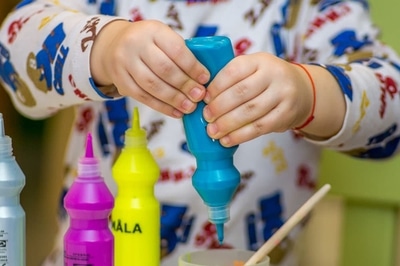 Dr. Maria Montessori understood that children begin using their senses to experience their surroundings as soon as they enter the world. Sensorial adventures start at the moment a child is born. Young children are constantly improving their perception, using their senses to study their environment.
Dr. Maria Montessori understood that children begin using their senses to experience their surroundings as soon as they enter the world. Sensorial adventures start at the moment a child is born. Young children are constantly improving their perception, using their senses to study their environment.
The Montessori philosophy considers the child the “sensorial explorer.” Because of this, Montessori preschools create space for children to learn and perceive qualities through experiences of the senses. Dr. Montessori developed the idea of sensorial work as education long before our modern idea of sensory play was put into practice in daycares and schools. Sensory experiences are essential to the brain development of young children, especially in the first few years of life.
What are Sensory Activities?
The goal of sensory activities in the Montessori curriculum is to create opportunities for preschoolers to become aware of and practice each of their senses. This list includes touch, smell, sight, sound, and taste but also integrates motion, balance, and spatial awareness.
Essentially, sensory play is any activity that employs your young child’s senses. For instance, children may engage in lessons that ask them to distinguish quiet and loud sounds, comparing a shaker filled with sand and a noisier shaker filled with beads.
Some of the benefits of sensory play in Montessori preschool are:
Problem Solving
In a Montessori preschool setting, sensorial learning introduces your child to various materials and activities that are designed to get them thinking about the way things work. Activities like deciphering smell or feel are designed to give young children a regulated, healthy amount of stress that uses their problem-solving abilities and helps them grow their critical thinking skills.
Emotional Regulation
Children at the preschool level are still in the early stages of communication development, leading them to feelings of anxiety or frustration when they are unable to express their needs. Sensorial activities are a fun, therapeutic way to help control your child’s frustration and inner turmoil. These activities aim to introduce young learners to new skills and lessons without overwhelming or overstimulating them. Sensory play can help young children with emotional regulation by teaching new methods of easing distress and calming uneasiness.
Boosted Creativity
Art activities and allowing children the freedom to experiment visually help young children learn to express themselves and feel comfortable communicating without their voices. Craft projects and toying with materials like pipe cleaners or paints might seem like easy, fun ways to pass the time for a preschooler, but these activities play a large part in a child’s sensory development. By encouraging art projects and other activities that require thinking outside of the box and using their senses, kids can enhance their perception alongside their creativity.
Mission Valley Montessori offers toddler, preschool and kindergarten programs that inspire children to love learning. Our toddler, preschool and kindergarten programs are best suited for children aged 18 months to 6 years. It is our aim to help your child reach their greatest potential. Reach out today to begin your journey with The Montessori Children’s House.
